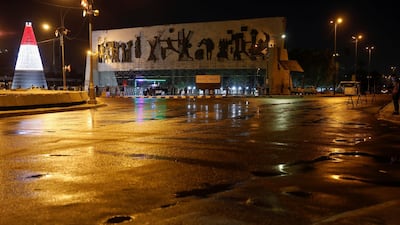In the narrow alleys of Shawaka neighbourhood on the banks of the Tigris river in central Baghdad, Sadiq Mohammed took it upon himself to be the suhoor drummer in his area, after his predecessor was killed by a car bombing in 2011.
"The neighbourhood needs a drummer to keep the tradition alive," he told The National.
Mr Mohammed, 33, who is enlisted in the government forces, takes a month off from his job so he can be his neighbourhood musaharati during the holy month.
"It is a responsibility, most of the people in our neighbourhood are elderly, and through my suhoor recitations, they know that Ramadan is about to come to an end," Sadiq told The National.
With his young son accompanying Mr Mohammed and his friend, he calls out "It's suhoor time, may Allah have mercy on you, it's suhoor time", a phrase people have grown accustomed to hearing for years, every Ramadan.
"Nothing has changed in what we say or what we do, we have been doing this since the days of my grandfather."
Mr Mohammed finds joy in the simplest of gestures, as his neighbours greet him on the street and children excitedly plead to take a swing at his drum and assist in waking up the street for their pre-dawn meal.
it is also an opportunity for Mr Mohammed to grab a bite before the dawn prayers, because people usually greet him with a drink or food, a common practice in working-class neighbourhoods he said, as he continued his rounds right up to the break of dawn.
As the holy month draws to a close, Mr Mohammed will adjust his call to bid farewell to the last day of Ramadan, as a reminder to the elderly that Eid is around the corner and the fasting days are over.
Even with the restrictions of the pandemic and the lockdowns, Shawka's alleys are still full of life. The people do not leave the area much.
"This is not the first lockdown, and it won't be the last. The neighbourhood never cared about such a thing," he said.
In many areas, people do it for the money. But Mr Mohammed's dedication to being a musaharati every year stems from his desire to keep this tradition going for his old neighbourhood and for generations to come.
"I wish, when my sons grow older, that they take on this tradition and keep it alive."













